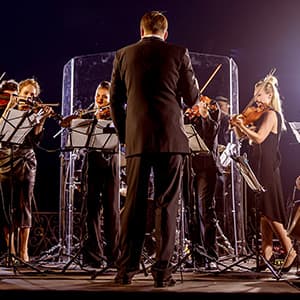

Beethoven Symphony No 4 Tickets
Up to 30% Off Compared to Competitors.
Location: Select Location (e.g, New York)
Events Nearby
We're Sorry. There are currently no events near you.
About Beethoven Symphony No. 4
In recent years, Beethoven's Symphony No. 4 has experienced a resurgence in popularity, particularly as orchestras around the globe commemorate the 250th anniversary of Beethoven's birth in 2020. Many major orchestras, including the Berlin Philharmonic, the Vienna Philharmonic, and the New York Philharmonic, have included the Fourth Symphony in their concert programs, often pairing it with other Beethoven works to provide a comprehensive experience of his contributions to classical music. Recent performances have highlighted not only traditional interpretations but also innovative renditions, incorporating contemporary elements and engaging multimedia presentations. Additionally, festivals dedicated to Beethoven's music, such as the Beethovenfest in Bonn, have featured the Fourth Symphony prominently, drawing audiences eager to connect with the composer's legacy. As orchestras continue to explore Beethoven's works, the Fourth Symphony remains a beloved piece, appreciated for its charm and elegance, and it serves as a reminder of the enduring power of live performances to bring classical music to life for new generations of concertgoers.
Beethoven Symphony No. 4 History
Ludwig van Beethoven's Symphony No. 4 in B-flat major, Op. 60, was composed in 1806 and is often regarded as one of his most cheerful and optimistic works. It was written during a period of great personal struggle for Beethoven, who was grappling with the onset of deafness. Despite his challenges, the Fourth Symphony showcases a lighter, more playful side of Beethoven's music, contrasting with the intensity of his earlier symphonies. The symphony was first performed in 1807 at the Theater an der Wien in Vienna, with Beethoven himself conducting. The work's structure, characterized by its four movements, follows the classical symphonic form, yet it includes innovative elements that foreshadow the Romantic era. The second movement, Adagio, is particularly notable for its lyrical beauty and has often been praised for its emotional depth. The Fourth Symphony, while not as frequently performed as Beethoven's Fifth or Ninth, has gained appreciation over the years for its balance of humor and gravitas, making it a staple in the repertoire of orchestras around the world. Its premiere and subsequent performances established Beethoven's reputation as a leading composer of his time, and the symphony continues to be celebrated in concert halls today.
